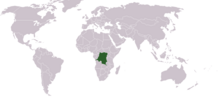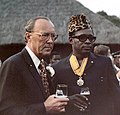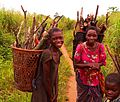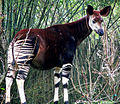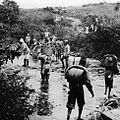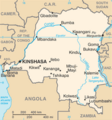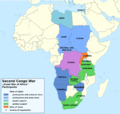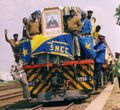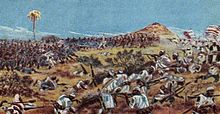
Back بوابة:جمهورية الكونغو الديمقراطية Arabic Portal:Demokratische Republik Kongo German Portal:República Democrática del Congo Spanish Portail:République démocratique du Congo French Portal:República Democrática do Congo Portuguese Портал:Демократическая Республика Конго Russian باب:جمہوری جمہوریہ کانگو Urdu
The Democratic Republic of the Congo Portal
The Democratic Republic of the Congo, also known as Congo-Kinshasa, Congo DR, DR Congo, DRC, or simply either Congo or the Congo, is a country in Central Africa. By land area, the DRC is the second-largest country in Africa and the 11th-largest in the world. With a population of around 105 million, the Democratic Republic of the Congo is the most populous Francophone country in the world, and the fourth-largest in Africa. The national capital and largest city is Kinshasa, which is also the economic center. The country is bordered by the Republic of the Congo, Central African Republic, South Sudan, Uganda, Rwanda, Burundi, Tanzania (across Lake Tanganyika), Zambia, Angola, the Cabinda exclave of Angola, and the South Atlantic Ocean. Centered on the Congo Basin, the territory of the DRC was first inhabited by Central African foragers around 90,000 years ago and was reached by the Bantu expansion about 3,000 years ago. In the west, the Kingdom of Kongo ruled around the mouth of the Congo River from the 14th to 19th centuries. In the northeast, center, and east, the kingdoms of Azande, Luba, and Lunda ruled from the 16th and 17th centuries to the 19th century. King Leopold II of Belgium formally acquired rights to the Congo territory from the colonial nations of Europe in 1885 and declared the land his private property, naming it the Congo Free State. From 1885 to 1908, his colonial military forced the local population to produce rubber and committed widespread atrocities. In 1908, Leopold ceded the territory, which thus became a Belgian colony. Congo achieved independence from Belgium on 30 June 1960 and was immediately confronted by a series of secessionist movements, the assassination of Prime Minister Patrice Lumumba, and the seizure of power by Mobutu Sese Seko in a 1965 coup d'état. Mobutu renamed the country Zaire in 1971 and imposed a harsh personalist dictatorship until his overthrow in 1997 by the First Congo War. The country then had its name changed back and was confronted by the Second Congo War from 1998 to 2003, which resulted in the deaths of 5.4 million people. The war ended under President Joseph Kabila, who governed the country from 2001 to 2019, under whom human rights in the country remained poor and included frequent abuses such as forced disappearances, torture, arbitrary imprisonment and restrictions on civil liberties. Following the 2018 general election, in the country's first peaceful transition of power since independence, Kabila was succeeded as president by Félix Tshisekedi, who has served as president since. Since 2015, the Eastern DR Congo has been the site of an ongoing military conflict in Kivu. The Democratic Republic of the Congo is extremely rich in natural resources but has suffered from political instability, a lack of infrastructure, corruption, and centuries of both commercial and colonial extraction and exploitation, followed by more than 60 years of independence, with little widespread development. Besides the capital Kinshasa, the two next largest cities, Lubumbashi and Mbuji-Mayi, are both mining communities. The DRC's largest export is raw minerals, with China accepting over 50% of its exports in 2019. In 2021, DR Congo's level of human development was ranked 179th out of 191 countries by the Human Development Index and is classed as a least developed country by the UN. , following two decades of various civil wars and continued internal conflicts, around 600,000 Congolese refugees were still living in neighbouring countries. Two million children risk starvation, and the fighting has displaced 4.5 million people. The country is a member of the United Nations, Non-Aligned Movement, African Union, COMESA, Southern African Development Community, Organisation Internationale de la Francophonie, and Economic Community of Central African States. (Full article...) Selected article - General elections were held in the Democratic Republic of the Congo on 30 December 2018, to determine a successor to President Joseph Kabila, as well as for the 500 seats of the National Assembly and the 715 elected seats of the 26 provincial assemblies. Félix Tshisekedi (UDPS) won with 38.6% of the vote, defeating another opposition candidate, Martin Fayulu, and Emmanuel Ramazani Shadary, backed by the ruling party PPRD. Fayulu alleged that the vote was rigged against him in a deal made by Tshisekedi and outgoing President Kabila, challenging the result in the DRC's Constitutional Court. Different election observers, including those from the country's Roman Catholic Church, also cast doubt on the official result. Nonetheless on 20 January the Court rejected his appeal and declared Tshisekedi as the winner. Parties supporting President Kabila won the majority of seats in the National Assembly. Félix Tshisekedi was sworn in as the 5th President of the Democratic Republic of the Congo on 24 January 2019, making it the first peaceful transition of power in the country since it became independent from Belgium in 1960. According to the constitution, the second and final term of President Kabila expired on 20 December 2016. General elections were originally scheduled for 27 November 2016, but were delayed with a promise to hold them by the end of 2017. This promise was subsequently broken, but after both international and internal pressure the elections were finally scheduled for 23 December 2018. They were, however, postponed for a week on 30 December 2018 due to a fire in the electoral commission's warehouse in Kinshasa destroying 8,000 electronic voting machines. (Full article...)General images -The following are images from various Democratic Republic of the Congo-related articles on Wikipedia.
This is a Good article, an article that meets a core set of high editorial standards.
The Battle of Rejaf, also known as the Battle of Bedden, was fought on 17 February 1897 between the Belgian-led forces of the Congo Free State and Mahdist rebels in Rejaf (now in present-day South Sudan). The battle resulted in a Congolese victory and the permanent expulsion of the Mahdists from the Lado Enclave, as well as the establishment of a Belgian outpost along the Nile. King Leopold II, the Belgian king and ruler of the Congo Free State, acquired the Lado Enclave in South Sudan from Britain in 1894 as part of a territory exchange which gave the British a strip of land along the eastern Congo for Belgian access to the navigable Nile. However, the territory was overrun with Mahdists who had established their stronghold at the town of Rejaf, which occupied a valuable position for trade along the Nile river. After a wave of new funding from the Belgian government in 1895, King Leopold ordered an expedition to be led into the Lado Enclave to expel the Mahdists and fortify Rejaf as a strategic military and trading outpost. (Full article...)This is a Featured article, which represents some of the best content on English Wikipedia..
Operation Grandslam was an offensive undertaken by United Nations peacekeeping forces from 28 December 1962 to 15 January 1963 against the forces of the State of Katanga, a secessionist state rebelling against the Republic of the Congo (now the Democratic Republic of the Congo) in Central Africa. The Katangese forces were decisively defeated and Katanga was forcibly reintegrated into the Congo. The United Nations had tried several times to reconcile the government of the Congo with the State of Katanga, which had declared independence under Moïse Tshombe with Belgian support in 1960. Though initially limiting its actions, the United Nations Operation in the Congo became increasingly impatient towards Katanga and Tshombe, drawing up plans to resolve the situation through force. Tshombe continuously violated agreements he had made with the United Nations and the Congolese government by building up his forces and bringing foreign mercenaries into the conflict. The situation reached a breaking point in December 1962 when Katangese gendarmes attacked peacekeeping forces in Katanga. United Nations Secretary-General U Thant authorised a retaliatory offensive to eliminate secessionist opposition. (Full article...)
WikiProjectsTopicsCategoriesRelated portalsAssociated WikimediaThe following Wikimedia Foundation sister projects provide more on this subject:
Discover Wikipedia using portals | ||||||
© MMXXIII Rich X Search. We shall prevail. All rights reserved. Rich X Search


